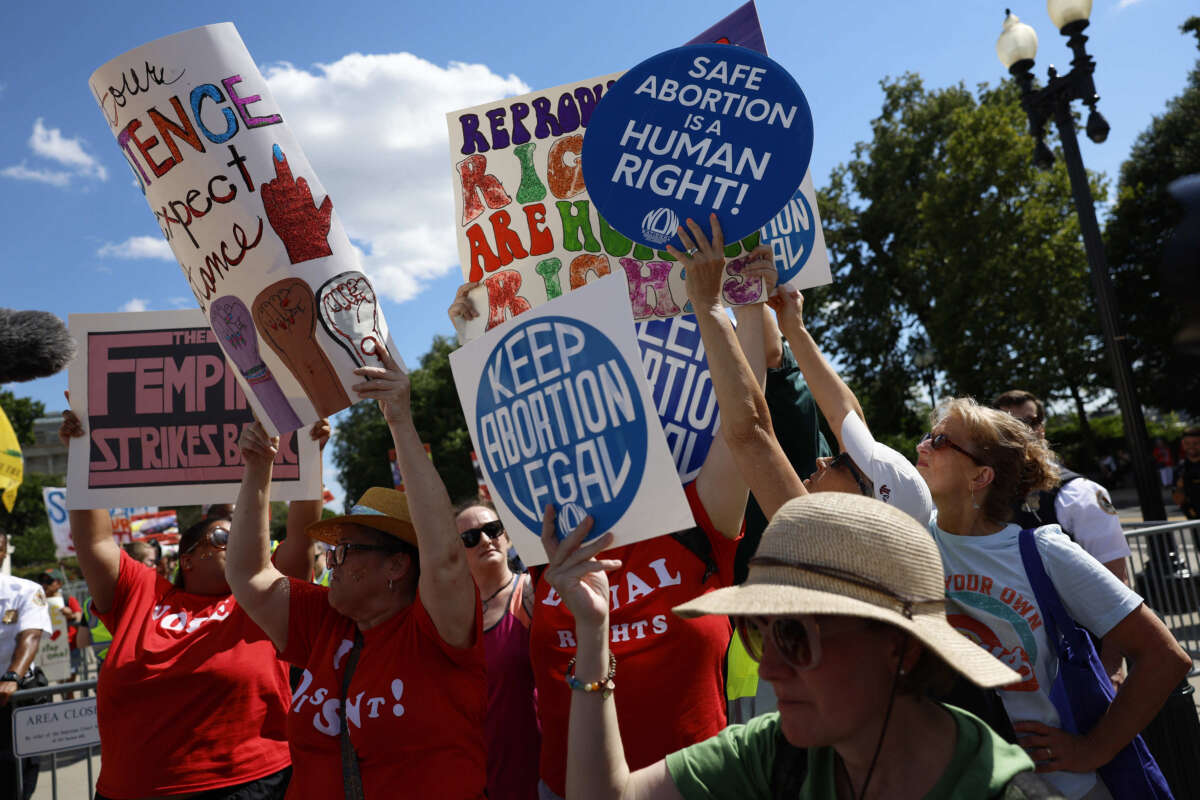Hundreds of medical professionals in Missouri have signed an open letter encouraging residents to support a ballot initiative in November that would enshrine abortion rights in the state constitution.
Missouri’s abortion ban, which was automatically triggered when the U.S. Supreme Court overturned Roe v. Wade in the summer of 2022, bars the procedure at all stages of pregnancy and makes no exceptions for rape or incest. Although the ban includes an exception for when a person’s life is endangered by their pregnancy, medical professionals are often reluctant to make such exceptions because laws are vague regarding what constitutes a life threatening emergency — and they could potentially face a steep penalty if the state disagrees with their assessment.
A person who performs an abortion in Missouri can face up to 15 years in prison, with a minimum sentence of five years if they’re found guilty.
The ballot measure in Missouri up for consideration in this year’s election would essentially overturn that law by protecting abortion rights up to the point of fetal viability, generally understood to be around 22-25 weeks of a pregnancy. Restrictions could be imposed after that point, but would be limited, as the measure includes protections to ensure a person’s life and health is prioritized.
Over 500 doctors and 300 other medical professionals signed the open letter calling for the abortion statute to be overturned by the constitutional ballot measure. The letter, which was organized by the Committee to Protect Health Care, makes note of the limited ways health care providers can help their patients.
“Missourians are being denied abortions and forced to continue life-threatening pregnancies, risking their health and lives,” the letter states. “Doctors can’t treat patients with heartbreaking pregnancy complications until they are on the brink of death. Otherwise, they could be put in jail.”
Pregnant people are left “with few options” when it comes to their health, the letter adds, forcing many Missourians “to leave the state to receive care, while others are forced to carry a pregnancy against their will.”
“Missouri families are suffering under this cruel abortion ban, and now is the time to end it,” the letter concludes.
Some doctors and medical professionals who signed the letter have described how hospital attorneys have advised them not to test the one exception to the law.
“When we have something that looks like it’s skirting the line and there’s a flicker of a heartbeat, but someone is desperately ill, sure I can call up the attorney. But they’re not going to put the hospital’s licensure on the line. They’re going to say ‘you know, good thing you live next to Kansas'” where abortion is currently legal, said Betsy Wickstrom, an obstetrician in Kansas City, speaking to the Missouri Independent on the matter.
“I don’t think that many hospitals feel comfortable testing this law because the government hasn’t provided us any clarity on it,” said Jennifer Smith, an OB-GYN in St. Louis.
Up until a week ago, the abortion measure faced uncertain odds of appearing on the ballot, as a lower state circuit-level judge ruled that it should be removed from the ballot on a technicality, after which Missouri Secretary of State Jay Ashcroft (R) tried to decertify the measure through his office, too.
The Missouri Supreme Court ruled that those actions were improper, and ordered Ashcroft to “certify to local election authorities” that the measure “be placed on the Nov. 5, 2024, general election ballot,” and to “take all steps necessary to ensure that it is on said ballot.”
The measure has a good chance of passing. According to a St. Louis University/YouGov poll conducted in August, 52 percent of residents in the state backed the abortion rights amendment, while only 34 percent said they were opposed.
Angry, shocked, overwhelmed? Take action: Support independent media.
We’ve borne witness to a chaotic first few months in Trump’s presidency.
Over the last months, each executive order has delivered shock and bewilderment — a core part of a strategy to make the right-wing turn feel inevitable and overwhelming. But, as organizer Sandra Avalos implored us to remember in Truthout last November, “Together, we are more powerful than Trump.”
Indeed, the Trump administration is pushing through executive orders, but — as we’ve reported at Truthout — many are in legal limbo and face court challenges from unions and civil rights groups. Efforts to quash anti-racist teaching and DEI programs are stalled by education faculty, staff, and students refusing to comply. And communities across the country are coming together to raise the alarm on ICE raids, inform neighbors of their civil rights, and protect each other in moving shows of solidarity.
It will be a long fight ahead. And as nonprofit movement media, Truthout plans to be there documenting and uplifting resistance.
As we undertake this life-sustaining work, we appeal for your support. Please, if you find value in what we do, join our community of sustainers by making a monthly or one-time gift.
